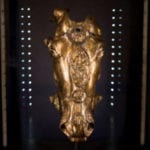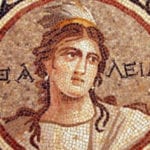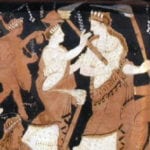 History
History  History
History  Weird Stuff
Weird Stuff 10 Wacky Conspiracy Theories You Will Need to Sit Down For
 Movies and TV
Movies and TV 10 Weird Ways That TV Shows Were Censored
 Our World
Our World 10 Places with Geological Features That Shouldn’t Exist
 Crime
Crime 10 Dark Details of the “Bodies in the Barrels” Murders
 Animals
Animals The Animal Kingdom’s 10 Greatest Dance Moves
 Movies and TV
Movies and TV 10 Box Office Bombs That We Should Have Predicted in 2025
 History
History 10 Extreme Laws That Tried to Engineer Society
 History
History 10 “Modern” Problems with Surprising Historical Analogs
 Health
Health 10 Everyday Activities That Secretly Alter Consciousness
 History
History 10 Dirty Government Secrets Revealed by Declassified Files
 Weird Stuff
Weird Stuff 10 Wacky Conspiracy Theories You Will Need to Sit Down For
 Movies and TV
Movies and TV 10 Weird Ways That TV Shows Were Censored
Who's Behind Listverse?

Jamie Frater
Head Editor
Jamie founded Listverse due to an insatiable desire to share fascinating, obscure, and bizarre facts. He has been a guest speaker on numerous national radio and television stations and is a five time published author.
More About Us Our World
Our World 10 Places with Geological Features That Shouldn’t Exist
 Crime
Crime 10 Dark Details of the “Bodies in the Barrels” Murders
 Animals
Animals The Animal Kingdom’s 10 Greatest Dance Moves
 Movies and TV
Movies and TV 10 Box Office Bombs That We Should Have Predicted in 2025
 History
History 10 Extreme Laws That Tried to Engineer Society
 History
History 10 “Modern” Problems with Surprising Historical Analogs
 Health
Health 10 Everyday Activities That Secretly Alter Consciousness
10 Surprising Facts About Magic And Superstition In Ancient Greece
Even today, horoscopes can be found in most newspapers, fortune tellers are present in every town and city, and many of us avoid walking under ladders (just in case). The rational Greeks were as superstitious as we are, and perhaps even more so. They left hundreds of writings and other material evidence behind attesting to how magic and superstition affected them in their daily life.
10Necromancy

Necromancy is about invoking the spirit of the dead for divinatory purposes and to get their help in magical affairs. In ancient Greece, people condemned necromancy publicly yet seemed to have accepted in private.
The amount of evidence on necromancy in ancient Greece is overwhelming. One of the earliest recorded examples comes from the Odyssey, where Odysseus performs a complicated ritual to contact the spirits of the dead by combining sacrifices, prayers, and offerings. Other literary evidence comes from Plato, who sounds skeptical about necromancy. Herodotus describes a necromantic ritual performed on the river Acheron where the Oracle of the dead is consulted by a messenger of Periander, the Tyrant of Corinth.
Material evidence on necromancy has been found on hundreds of inscribed curse tablets, placed in graves (along with other objects such as figurines) and asking the spirits of the dead for their aid.
9Superstition And Mathematics

The square root of 2 is an irrational number (i.e., it cannot be expressed by any simple fraction). When the Pythagoreans came across this seemingly harmless information, it undermined the very core of their beliefs. Mathematics, for the Pythagoreans, was inseparable from mysticism and religious life, and the structure of the cosmos was believed to be linked to mathematical harmony.
The Pythagoreans tried to keep this issue secret, but one of member divulged it outside the brotherhood. The traitor was thrown into deep waters and drowned. Many authors describe this person as early martyr to science. A case could be made that this person was a martyr of superstition, since it was not the scientific aspect of irrational numbers that motivated the homicide but rather its religious extrapolations.
8Concoctions

Recipes for all kinds of concoctions were known to the ancient Greeks. Their functions were truly diverse, and many were both amusing and useless.
To make a woman fart uncontrollably: “Take some hairs from a donkey’s rump, burn them and grind them up, and then give them to a woman in a drink.”
How to become invisible: “Engrave a quail on an onyx stone with a sea perch at its feet [and] put under the stone some of the mixture used in lamps. Smear your face with the concoction, and no one will see either who you are or what you are doing.”
To make a woman confess the name of the man she loves: “Put a bird’s tongue under her lips or on her heart and ask the question. She will say his name three times.”
7A Living Goddess

Peisistratos was tyrant who ruled Athens several times during the sixth century BC. According to Herodotus, Peisistratos regained the power of Athens in one occasion by taking a tall and beautiful peasant girl and dressing her as the goddess Athena, wearing her armor and riding a chariot into the city.
Peisistratos rode next to the girl. Meanwhile, a group of heralds announced that the goddess was bringing Peisistratos back to take control of the city. The trick worked, and Athens became under the rule of this clever tyrant.
6Animal Sacrifices

Oxen, goats, and sheep were the top choices for animal sacrifices in ancient Greece, but there were also some unconventional choices. According to Plutarch, puppies were sacrificed by the Spartans to honor the war god Enyalius
Sometimes, animal sacrifices went out of control, like it did after the Battle of Marathon in 490 BC. Xenophon reported that the Athenians promised the goddess Artemis that they would sacrifice one goat in her honor for every enemy they killed. Herodotus reports that the Athenians killed 6,400 enemies during the battle, and there were simply not enough goats. Instead, the Athenians agreed to perform a ritual every year in which they would sacrifice 500 goats to Artemis. Xenophon’s report said this ritual was still observed 100 years after Marathon.
5Amulets

The belief in the magical properties of amulets was shared by many in Greece. Farmers, constantly worried about the weather, were especially vulnerable to deposit their hopes in the magic properties these items. Many of them wore amulets around their necks or wrists to ensure the right level of rainfall for their crops to prosper.
Other properties of amulets included: to keep way robbers, good luck, contraception, to attract a lover, and to protect its wearer from spells and harmful magic aimed against. Some had curious shapes which enhanced their power, which included Egyptian crabs, hands making obscene gestures, phalluses, eyes, and vulvas.
4Magic Spells

Spell have been found inscribed on numerous tablets all over ancient Greece. Many were linked to medical practices, either to help someone get better, improve the efficiency of medicines, or even to poison or harm enemies. Although spells ware mainly spoken, it was believed that their efficiency would increase if they were supported by specific actions such as inscribing the words and using images of humans, animals, demons, and mystical symbols.
Thessaly was one region strongly linked to witchcraft. Literary sources suggest that professional witches in this area were in the business of selling spells tailored to their customer’s specification. Aristophanes describes one of his characters, Strepsiades, thinking about contacting the Thessalian witches so he could buy a spell from them. Strepsiades was in debt, and his idea was to trap the Moon using one of this spells. If the Moon did not rise again, the monthly interest of his debt could not keep building.
3Oracles

Oracles in ancient Greece could mean two closely related things: a statement made by different deities (some of which could come through an intermediary), or the sites where such statements were made. Many of these statements were responses to human questions. Some would be simply “yes” or “no,” while some other could come in a cryptic or ambiguous form.
The oracle of Zeus at Dodona in Epirus is one of the oldest Greek oracles. During the fifth century BC, the priestesses spoke on behalf of the god Zeus and provided affirmative or negative answers to questions inscribed on lead tablets. About 80 of such tablets survive to our days and can be found in the museum at Ioannina in Greece. A few examples:
“Lysanias asks Zeus and Dione whether he is the father of the boy borne by Annyla.”
“Cleoutas asks Zeus and Dione if it is profitable and beneficial for him to graze sheep.”
2Astrology

Astrology influenced the Greek mind in two ways: either by claiming that planetary behavior had an inescapable influence on human affairs, or by acting as a guideline in relation to human personalities and trends according the position of celestial bodies at the time when individuals were born.
Many ancient Greek astrological works have survived. One of the most famous was written by the astrologer Vettius Valens (second century BC) who, judging by his tone and words, does not sound very optimistic in relation to personality trends linked to the signs of the zodiac. In his work The Astrological Anthologies, for example, he said that being born under Taurus is shameful, and that such people are likely to suffer from “pain in the nostrils through injury and disease, broken limbs, throat tumors, sciatica, and abscesses. Capricorn, Valens adds, is a “wicked and inconsistent” sign, and such people are “prone to making mistakes, fickle, criminal, dishonest, censorious, and disgusting.”
1Dreams

The idea the dreams could foretell the future was widespread in ancient Greece. The ancient diviner Artemidorus compiled a work named Interpretation of Dreams, where he reveals some intricate meanings linked to number games
“Seeing a weasel in a dream signifies an evil and tricky woman and a lawsuit, for ‘lawsuit’ and ‘weasel’ are isopsephic [so if we add the numerical value of the letters in these words, they are both equal].”
“Seeing an old woman in a dream foretells death to a sick person, since [the words] ‘old woman’, adds up to 704, and ‘the funeral’ adds to 704. An old woman symbolizes a funeral in any case, since she is going to die in the not very distant future.”








